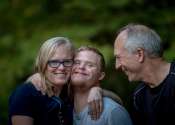Down syndrome, like Alzheimer's, is a double-prion disorder
The brains of people with Down syndrome develop the same neurodegenerative tangles and plaques associated with Alzheimer's disease and frequently demonstrate signs of the neurodegenerative disorder in their forties or fifties. ...
Nov 18, 2022
0
115








